Unit 4: Management and Operations Report - Hilton Hotel Analysis
VerifiedAdded on 2023/01/16
|11
|3319
|67
Report
AI Summary
This report provides a comprehensive analysis of leadership and management within the framework of operations management. It begins by defining and comparing the roles and characteristics of leaders and managers, highlighting their differences and similarities. The report then examines how these roles apply in various situational contexts, considering both internal and external organizational changes. Furthermore, it explores the application of different leadership theories and models, including situational leadership, systems leadership, and contingency theory, providing real-world examples. The report also explains key approaches to operations management, emphasizing the crucial roles that leaders and managers play in enhancing productivity and achieving organizational objectives. The analysis includes a case study of the Hilton hotel, illustrating how different leadership and management styles are applied in practice and how various theories are implemented to achieve business goals. Finally, the report discusses the factors within the business environment that impact decision-making and operational management.
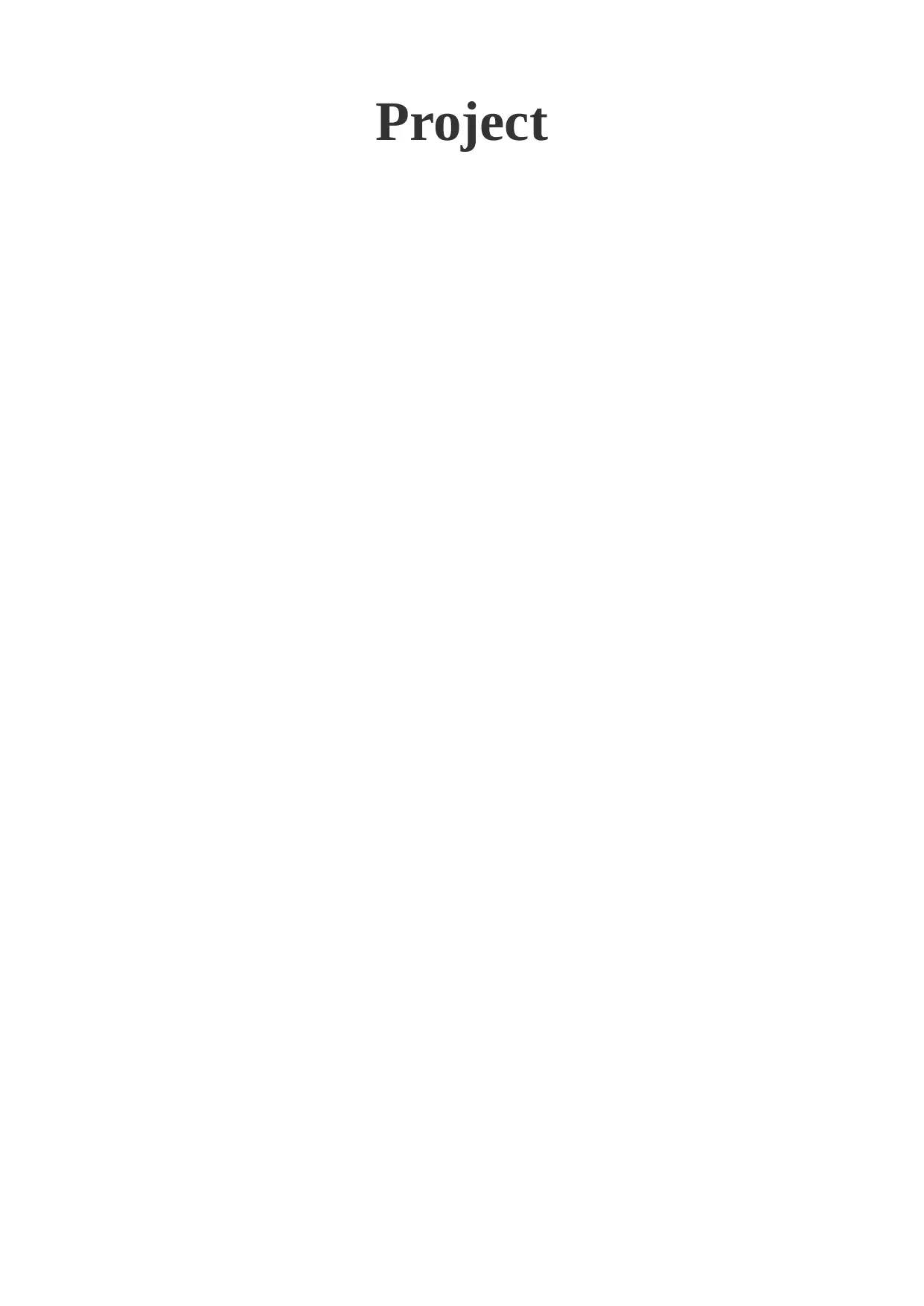
Project
Paraphrase This Document
Need a fresh take? Get an instant paraphrase of this document with our AI Paraphraser
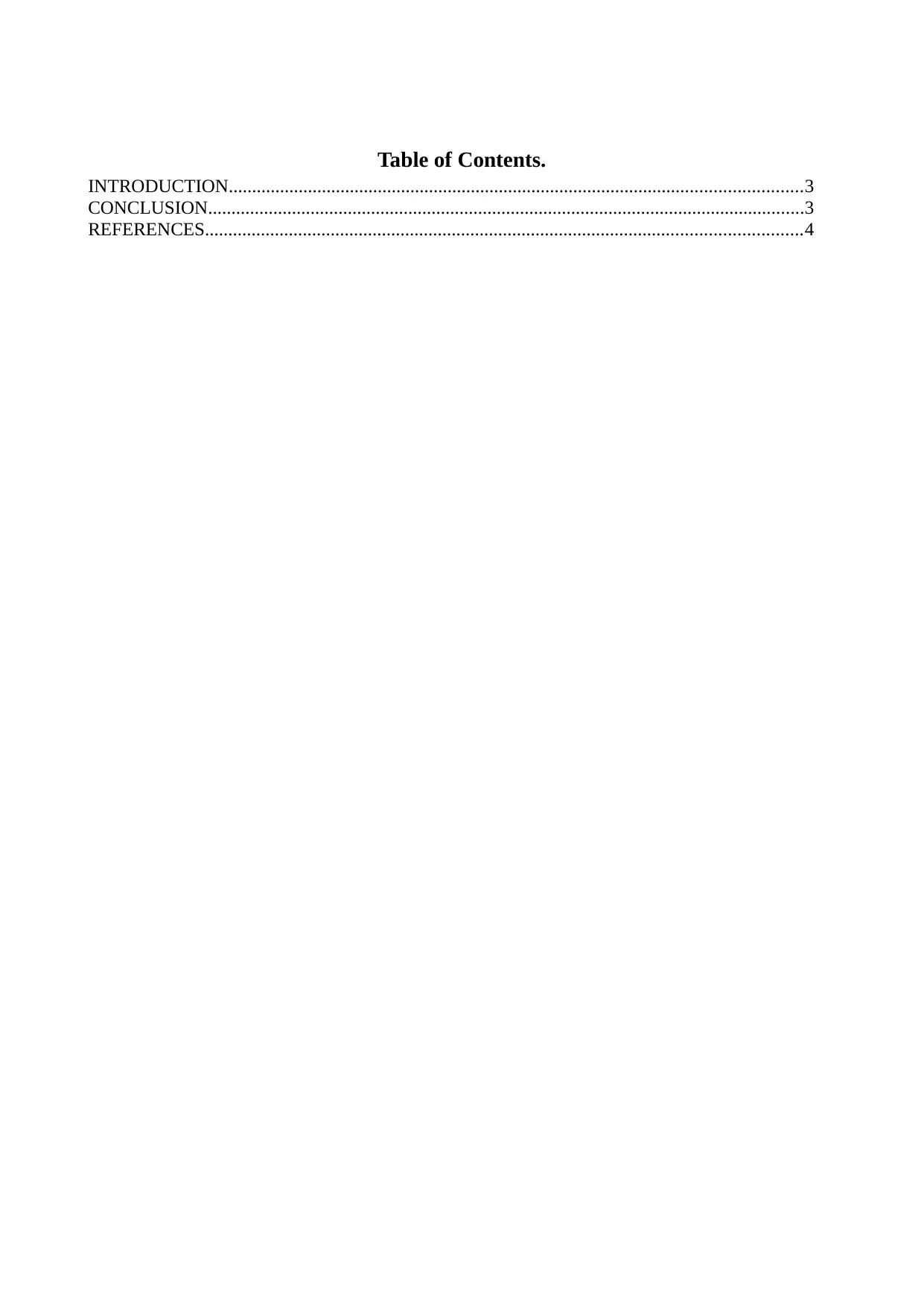
Table of Contents.
INTRODUCTION...........................................................................................................................3
CONCLUSION................................................................................................................................3
REFERENCES................................................................................................................................4
INTRODUCTION...........................................................................................................................3
CONCLUSION................................................................................................................................3
REFERENCES................................................................................................................................4
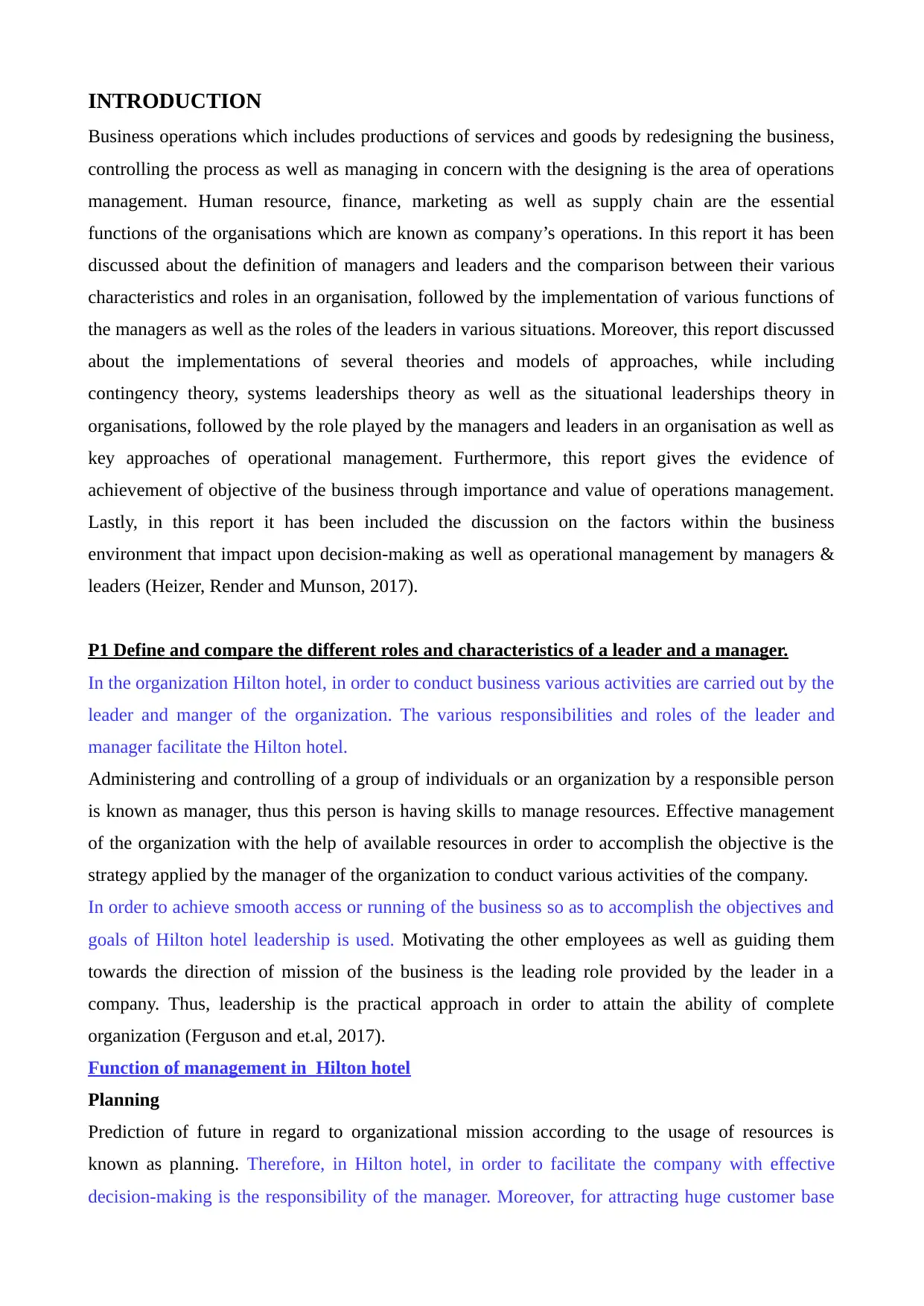
INTRODUCTION
Business operations which includes productions of services and goods by redesigning the business,
controlling the process as well as managing in concern with the designing is the area of operations
management. Human resource, finance, marketing as well as supply chain are the essential
functions of the organisations which are known as company’s operations. In this report it has been
discussed about the definition of managers and leaders and the comparison between their various
characteristics and roles in an organisation, followed by the implementation of various functions of
the managers as well as the roles of the leaders in various situations. Moreover, this report discussed
about the implementations of several theories and models of approaches, while including
contingency theory, systems leaderships theory as well as the situational leaderships theory in
organisations, followed by the role played by the managers and leaders in an organisation as well as
key approaches of operational management. Furthermore, this report gives the evidence of
achievement of objective of the business through importance and value of operations management.
Lastly, in this report it has been included the discussion on the factors within the business
environment that impact upon decision-making as well as operational management by managers &
leaders (Heizer, Render and Munson, 2017).
P1 Define and compare the different roles and characteristics of a leader and a manager.
In the organization Hilton hotel, in order to conduct business various activities are carried out by the
leader and manger of the organization. The various responsibilities and roles of the leader and
manager facilitate the Hilton hotel.
Administering and controlling of a group of individuals or an organization by a responsible person
is known as manager, thus this person is having skills to manage resources. Effective management
of the organization with the help of available resources in order to accomplish the objective is the
strategy applied by the manager of the organization to conduct various activities of the company.
In order to achieve smooth access or running of the business so as to accomplish the objectives and
goals of Hilton hotel leadership is used. Motivating the other employees as well as guiding them
towards the direction of mission of the business is the leading role provided by the leader in a
company. Thus, leadership is the practical approach in order to attain the ability of complete
organization (Ferguson and et.al, 2017).
Function of management in Hilton hotel
Planning
Prediction of future in regard to organizational mission according to the usage of resources is
known as planning. Therefore, in Hilton hotel, in order to facilitate the company with effective
decision-making is the responsibility of the manager. Moreover, for attracting huge customer base
Business operations which includes productions of services and goods by redesigning the business,
controlling the process as well as managing in concern with the designing is the area of operations
management. Human resource, finance, marketing as well as supply chain are the essential
functions of the organisations which are known as company’s operations. In this report it has been
discussed about the definition of managers and leaders and the comparison between their various
characteristics and roles in an organisation, followed by the implementation of various functions of
the managers as well as the roles of the leaders in various situations. Moreover, this report discussed
about the implementations of several theories and models of approaches, while including
contingency theory, systems leaderships theory as well as the situational leaderships theory in
organisations, followed by the role played by the managers and leaders in an organisation as well as
key approaches of operational management. Furthermore, this report gives the evidence of
achievement of objective of the business through importance and value of operations management.
Lastly, in this report it has been included the discussion on the factors within the business
environment that impact upon decision-making as well as operational management by managers &
leaders (Heizer, Render and Munson, 2017).
P1 Define and compare the different roles and characteristics of a leader and a manager.
In the organization Hilton hotel, in order to conduct business various activities are carried out by the
leader and manger of the organization. The various responsibilities and roles of the leader and
manager facilitate the Hilton hotel.
Administering and controlling of a group of individuals or an organization by a responsible person
is known as manager, thus this person is having skills to manage resources. Effective management
of the organization with the help of available resources in order to accomplish the objective is the
strategy applied by the manager of the organization to conduct various activities of the company.
In order to achieve smooth access or running of the business so as to accomplish the objectives and
goals of Hilton hotel leadership is used. Motivating the other employees as well as guiding them
towards the direction of mission of the business is the leading role provided by the leader in a
company. Thus, leadership is the practical approach in order to attain the ability of complete
organization (Ferguson and et.al, 2017).
Function of management in Hilton hotel
Planning
Prediction of future in regard to organizational mission according to the usage of resources is
known as planning. Therefore, in Hilton hotel, in order to facilitate the company with effective
decision-making is the responsibility of the manager. Moreover, for attracting huge customer base
⊘ This is a preview!⊘
Do you want full access?
Subscribe today to unlock all pages.

Trusted by 1+ million students worldwide
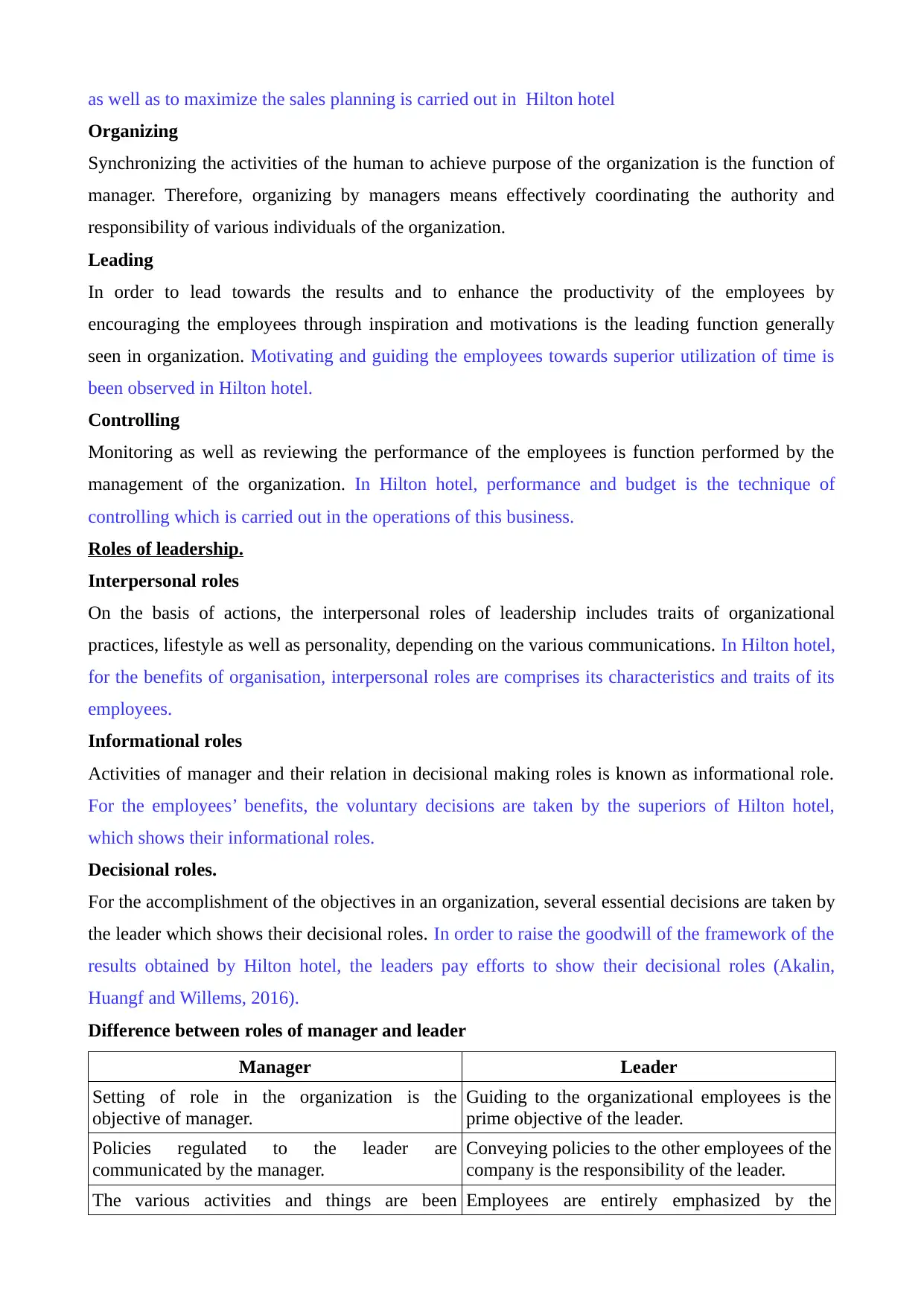
as well as to maximize the sales planning is carried out in Hilton hotel
Organizing
Synchronizing the activities of the human to achieve purpose of the organization is the function of
manager. Therefore, organizing by managers means effectively coordinating the authority and
responsibility of various individuals of the organization.
Leading
In order to lead towards the results and to enhance the productivity of the employees by
encouraging the employees through inspiration and motivations is the leading function generally
seen in organization. Motivating and guiding the employees towards superior utilization of time is
been observed in Hilton hotel.
Controlling
Monitoring as well as reviewing the performance of the employees is function performed by the
management of the organization. In Hilton hotel, performance and budget is the technique of
controlling which is carried out in the operations of this business.
Roles of leadership.
Interpersonal roles
On the basis of actions, the interpersonal roles of leadership includes traits of organizational
practices, lifestyle as well as personality, depending on the various communications. In Hilton hotel,
for the benefits of organisation, interpersonal roles are comprises its characteristics and traits of its
employees.
Informational roles
Activities of manager and their relation in decisional making roles is known as informational role.
For the employees’ benefits, the voluntary decisions are taken by the superiors of Hilton hotel,
which shows their informational roles.
Decisional roles.
For the accomplishment of the objectives in an organization, several essential decisions are taken by
the leader which shows their decisional roles. In order to raise the goodwill of the framework of the
results obtained by Hilton hotel, the leaders pay efforts to show their decisional roles (Akalin,
Huangf and Willems, 2016).
Difference between roles of manager and leader
Manager Leader
Setting of role in the organization is the
objective of manager.
Guiding to the organizational employees is the
prime objective of the leader.
Policies regulated to the leader are
communicated by the manager.
Conveying policies to the other employees of the
company is the responsibility of the leader.
The various activities and things are been Employees are entirely emphasized by the
Organizing
Synchronizing the activities of the human to achieve purpose of the organization is the function of
manager. Therefore, organizing by managers means effectively coordinating the authority and
responsibility of various individuals of the organization.
Leading
In order to lead towards the results and to enhance the productivity of the employees by
encouraging the employees through inspiration and motivations is the leading function generally
seen in organization. Motivating and guiding the employees towards superior utilization of time is
been observed in Hilton hotel.
Controlling
Monitoring as well as reviewing the performance of the employees is function performed by the
management of the organization. In Hilton hotel, performance and budget is the technique of
controlling which is carried out in the operations of this business.
Roles of leadership.
Interpersonal roles
On the basis of actions, the interpersonal roles of leadership includes traits of organizational
practices, lifestyle as well as personality, depending on the various communications. In Hilton hotel,
for the benefits of organisation, interpersonal roles are comprises its characteristics and traits of its
employees.
Informational roles
Activities of manager and their relation in decisional making roles is known as informational role.
For the employees’ benefits, the voluntary decisions are taken by the superiors of Hilton hotel,
which shows their informational roles.
Decisional roles.
For the accomplishment of the objectives in an organization, several essential decisions are taken by
the leader which shows their decisional roles. In order to raise the goodwill of the framework of the
results obtained by Hilton hotel, the leaders pay efforts to show their decisional roles (Akalin,
Huangf and Willems, 2016).
Difference between roles of manager and leader
Manager Leader
Setting of role in the organization is the
objective of manager.
Guiding to the organizational employees is the
prime objective of the leader.
Policies regulated to the leader are
communicated by the manager.
Conveying policies to the other employees of the
company is the responsibility of the leader.
The various activities and things are been Employees are entirely emphasized by the
Paraphrase This Document
Need a fresh take? Get an instant paraphrase of this document with our AI Paraphraser
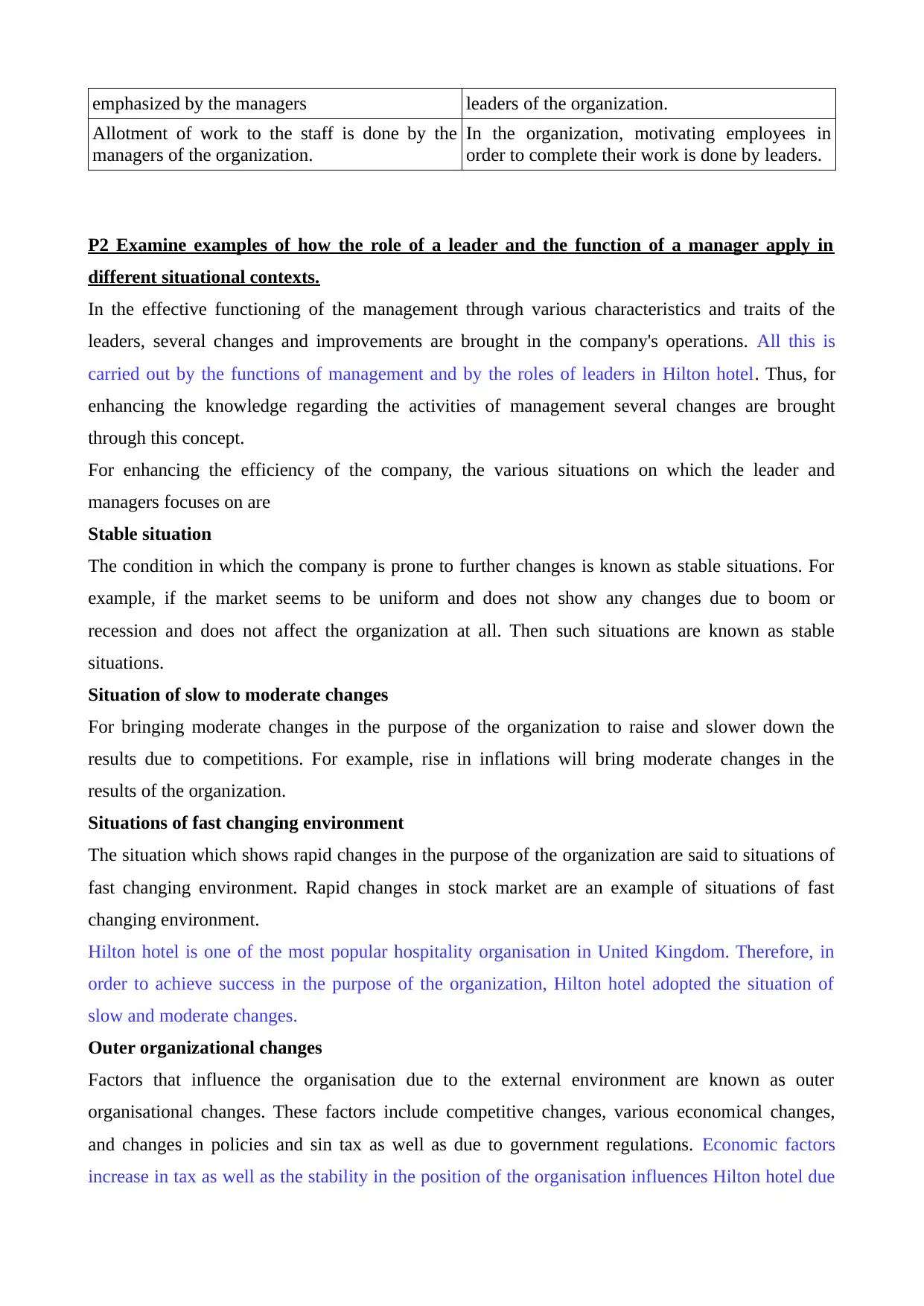
emphasized by the managers leaders of the organization.
Allotment of work to the staff is done by the
managers of the organization.
In the organization, motivating employees in
order to complete their work is done by leaders.
P2 Examine examples of how the role of a leader and the function of a manager apply in
different situational contexts.
In the effective functioning of the management through various characteristics and traits of the
leaders, several changes and improvements are brought in the company's operations. All this is
carried out by the functions of management and by the roles of leaders in Hilton hotel. Thus, for
enhancing the knowledge regarding the activities of management several changes are brought
through this concept.
For enhancing the efficiency of the company, the various situations on which the leader and
managers focuses on are
Stable situation
The condition in which the company is prone to further changes is known as stable situations. For
example, if the market seems to be uniform and does not show any changes due to boom or
recession and does not affect the organization at all. Then such situations are known as stable
situations.
Situation of slow to moderate changes
For bringing moderate changes in the purpose of the organization to raise and slower down the
results due to competitions. For example, rise in inflations will bring moderate changes in the
results of the organization.
Situations of fast changing environment
The situation which shows rapid changes in the purpose of the organization are said to situations of
fast changing environment. Rapid changes in stock market are an example of situations of fast
changing environment.
Hilton hotel is one of the most popular hospitality organisation in United Kingdom. Therefore, in
order to achieve success in the purpose of the organization, Hilton hotel adopted the situation of
slow and moderate changes.
Outer organizational changes
Factors that influence the organisation due to the external environment are known as outer
organisational changes. These factors include competitive changes, various economical changes,
and changes in policies and sin tax as well as due to government regulations. Economic factors
increase in tax as well as the stability in the position of the organisation influences Hilton hotel due
Allotment of work to the staff is done by the
managers of the organization.
In the organization, motivating employees in
order to complete their work is done by leaders.
P2 Examine examples of how the role of a leader and the function of a manager apply in
different situational contexts.
In the effective functioning of the management through various characteristics and traits of the
leaders, several changes and improvements are brought in the company's operations. All this is
carried out by the functions of management and by the roles of leaders in Hilton hotel. Thus, for
enhancing the knowledge regarding the activities of management several changes are brought
through this concept.
For enhancing the efficiency of the company, the various situations on which the leader and
managers focuses on are
Stable situation
The condition in which the company is prone to further changes is known as stable situations. For
example, if the market seems to be uniform and does not show any changes due to boom or
recession and does not affect the organization at all. Then such situations are known as stable
situations.
Situation of slow to moderate changes
For bringing moderate changes in the purpose of the organization to raise and slower down the
results due to competitions. For example, rise in inflations will bring moderate changes in the
results of the organization.
Situations of fast changing environment
The situation which shows rapid changes in the purpose of the organization are said to situations of
fast changing environment. Rapid changes in stock market are an example of situations of fast
changing environment.
Hilton hotel is one of the most popular hospitality organisation in United Kingdom. Therefore, in
order to achieve success in the purpose of the organization, Hilton hotel adopted the situation of
slow and moderate changes.
Outer organizational changes
Factors that influence the organisation due to the external environment are known as outer
organisational changes. These factors include competitive changes, various economical changes,
and changes in policies and sin tax as well as due to government regulations. Economic factors
increase in tax as well as the stability in the position of the organisation influences Hilton hotel due
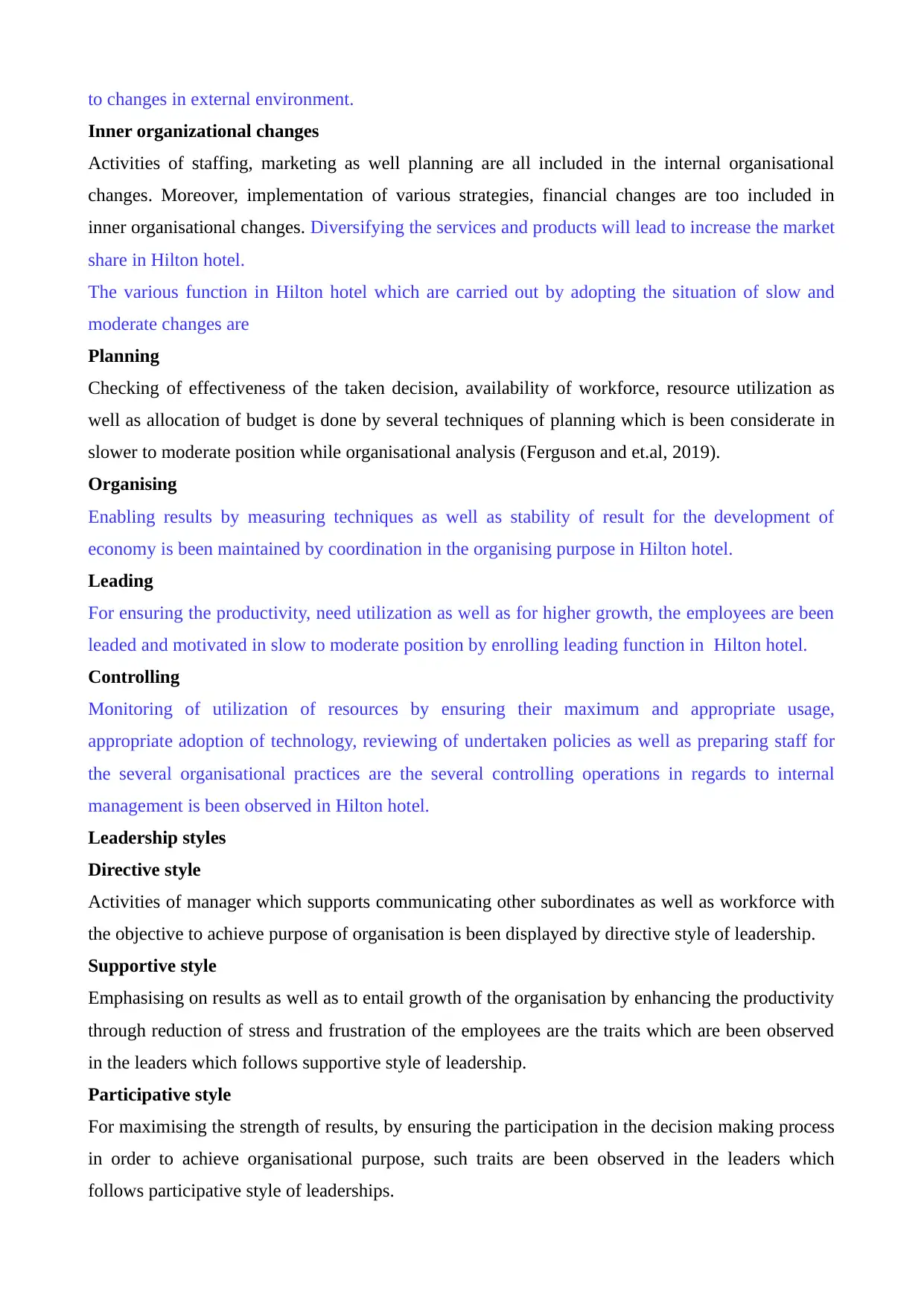
to changes in external environment.
Inner organizational changes
Activities of staffing, marketing as well planning are all included in the internal organisational
changes. Moreover, implementation of various strategies, financial changes are too included in
inner organisational changes. Diversifying the services and products will lead to increase the market
share in Hilton hotel.
The various function in Hilton hotel which are carried out by adopting the situation of slow and
moderate changes are
Planning
Checking of effectiveness of the taken decision, availability of workforce, resource utilization as
well as allocation of budget is done by several techniques of planning which is been considerate in
slower to moderate position while organisational analysis (Ferguson and et.al, 2019).
Organising
Enabling results by measuring techniques as well as stability of result for the development of
economy is been maintained by coordination in the organising purpose in Hilton hotel.
Leading
For ensuring the productivity, need utilization as well as for higher growth, the employees are been
leaded and motivated in slow to moderate position by enrolling leading function in Hilton hotel.
Controlling
Monitoring of utilization of resources by ensuring their maximum and appropriate usage,
appropriate adoption of technology, reviewing of undertaken policies as well as preparing staff for
the several organisational practices are the several controlling operations in regards to internal
management is been observed in Hilton hotel.
Leadership styles
Directive style
Activities of manager which supports communicating other subordinates as well as workforce with
the objective to achieve purpose of organisation is been displayed by directive style of leadership.
Supportive style
Emphasising on results as well as to entail growth of the organisation by enhancing the productivity
through reduction of stress and frustration of the employees are the traits which are been observed
in the leaders which follows supportive style of leadership.
Participative style
For maximising the strength of results, by ensuring the participation in the decision making process
in order to achieve organisational purpose, such traits are been observed in the leaders which
follows participative style of leaderships.
Inner organizational changes
Activities of staffing, marketing as well planning are all included in the internal organisational
changes. Moreover, implementation of various strategies, financial changes are too included in
inner organisational changes. Diversifying the services and products will lead to increase the market
share in Hilton hotel.
The various function in Hilton hotel which are carried out by adopting the situation of slow and
moderate changes are
Planning
Checking of effectiveness of the taken decision, availability of workforce, resource utilization as
well as allocation of budget is done by several techniques of planning which is been considerate in
slower to moderate position while organisational analysis (Ferguson and et.al, 2019).
Organising
Enabling results by measuring techniques as well as stability of result for the development of
economy is been maintained by coordination in the organising purpose in Hilton hotel.
Leading
For ensuring the productivity, need utilization as well as for higher growth, the employees are been
leaded and motivated in slow to moderate position by enrolling leading function in Hilton hotel.
Controlling
Monitoring of utilization of resources by ensuring their maximum and appropriate usage,
appropriate adoption of technology, reviewing of undertaken policies as well as preparing staff for
the several organisational practices are the several controlling operations in regards to internal
management is been observed in Hilton hotel.
Leadership styles
Directive style
Activities of manager which supports communicating other subordinates as well as workforce with
the objective to achieve purpose of organisation is been displayed by directive style of leadership.
Supportive style
Emphasising on results as well as to entail growth of the organisation by enhancing the productivity
through reduction of stress and frustration of the employees are the traits which are been observed
in the leaders which follows supportive style of leadership.
Participative style
For maximising the strength of results, by ensuring the participation in the decision making process
in order to achieve organisational purpose, such traits are been observed in the leaders which
follows participative style of leaderships.
⊘ This is a preview!⊘
Do you want full access?
Subscribe today to unlock all pages.

Trusted by 1+ million students worldwide
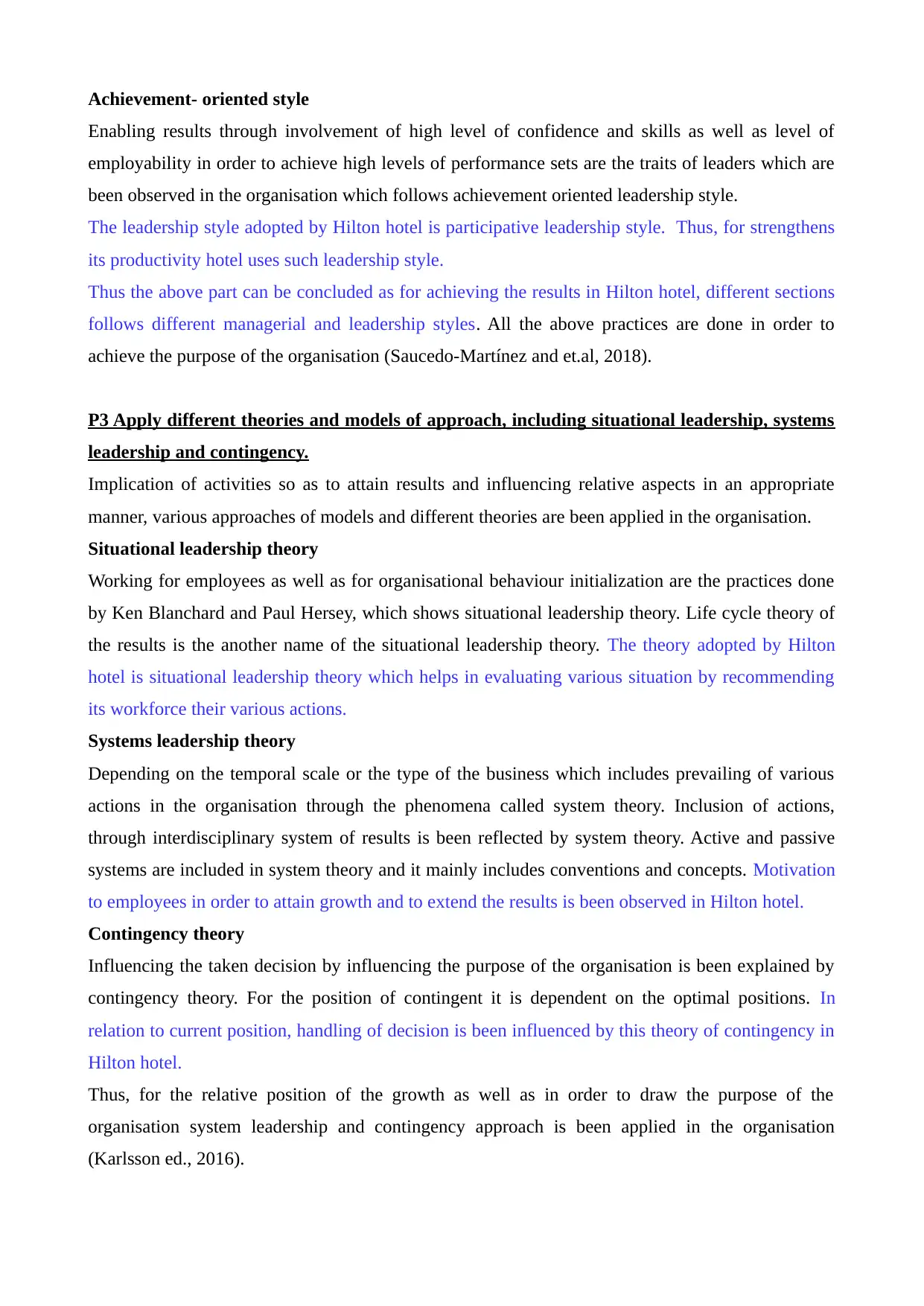
Achievement- oriented style
Enabling results through involvement of high level of confidence and skills as well as level of
employability in order to achieve high levels of performance sets are the traits of leaders which are
been observed in the organisation which follows achievement oriented leadership style.
The leadership style adopted by Hilton hotel is participative leadership style. Thus, for strengthens
its productivity hotel uses such leadership style.
Thus the above part can be concluded as for achieving the results in Hilton hotel, different sections
follows different managerial and leadership styles. All the above practices are done in order to
achieve the purpose of the organisation (Saucedo-Martínez and et.al, 2018).
P3 Apply different theories and models of approach, including situational leadership, systems
leadership and contingency.
Implication of activities so as to attain results and influencing relative aspects in an appropriate
manner, various approaches of models and different theories are been applied in the organisation.
Situational leadership theory
Working for employees as well as for organisational behaviour initialization are the practices done
by Ken Blanchard and Paul Hersey, which shows situational leadership theory. Life cycle theory of
the results is the another name of the situational leadership theory. The theory adopted by Hilton
hotel is situational leadership theory which helps in evaluating various situation by recommending
its workforce their various actions.
Systems leadership theory
Depending on the temporal scale or the type of the business which includes prevailing of various
actions in the organisation through the phenomena called system theory. Inclusion of actions,
through interdisciplinary system of results is been reflected by system theory. Active and passive
systems are included in system theory and it mainly includes conventions and concepts. Motivation
to employees in order to attain growth and to extend the results is been observed in Hilton hotel.
Contingency theory
Influencing the taken decision by influencing the purpose of the organisation is been explained by
contingency theory. For the position of contingent it is dependent on the optimal positions. In
relation to current position, handling of decision is been influenced by this theory of contingency in
Hilton hotel.
Thus, for the relative position of the growth as well as in order to draw the purpose of the
organisation system leadership and contingency approach is been applied in the organisation
(Karlsson ed., 2016).
Enabling results through involvement of high level of confidence and skills as well as level of
employability in order to achieve high levels of performance sets are the traits of leaders which are
been observed in the organisation which follows achievement oriented leadership style.
The leadership style adopted by Hilton hotel is participative leadership style. Thus, for strengthens
its productivity hotel uses such leadership style.
Thus the above part can be concluded as for achieving the results in Hilton hotel, different sections
follows different managerial and leadership styles. All the above practices are done in order to
achieve the purpose of the organisation (Saucedo-Martínez and et.al, 2018).
P3 Apply different theories and models of approach, including situational leadership, systems
leadership and contingency.
Implication of activities so as to attain results and influencing relative aspects in an appropriate
manner, various approaches of models and different theories are been applied in the organisation.
Situational leadership theory
Working for employees as well as for organisational behaviour initialization are the practices done
by Ken Blanchard and Paul Hersey, which shows situational leadership theory. Life cycle theory of
the results is the another name of the situational leadership theory. The theory adopted by Hilton
hotel is situational leadership theory which helps in evaluating various situation by recommending
its workforce their various actions.
Systems leadership theory
Depending on the temporal scale or the type of the business which includes prevailing of various
actions in the organisation through the phenomena called system theory. Inclusion of actions,
through interdisciplinary system of results is been reflected by system theory. Active and passive
systems are included in system theory and it mainly includes conventions and concepts. Motivation
to employees in order to attain growth and to extend the results is been observed in Hilton hotel.
Contingency theory
Influencing the taken decision by influencing the purpose of the organisation is been explained by
contingency theory. For the position of contingent it is dependent on the optimal positions. In
relation to current position, handling of decision is been influenced by this theory of contingency in
Hilton hotel.
Thus, for the relative position of the growth as well as in order to draw the purpose of the
organisation system leadership and contingency approach is been applied in the organisation
(Karlsson ed., 2016).
Paraphrase This Document
Need a fresh take? Get an instant paraphrase of this document with our AI Paraphraser
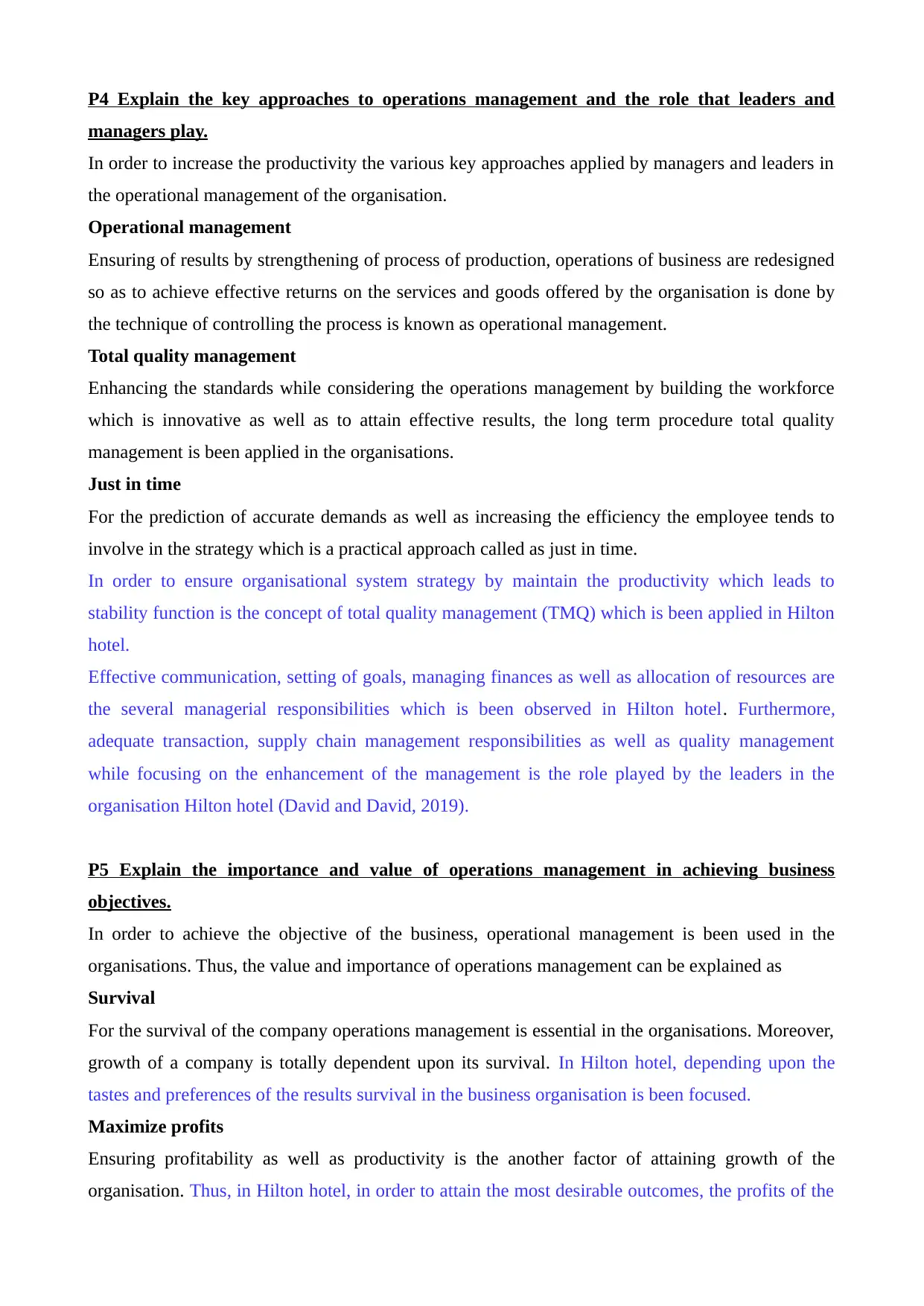
P4 Explain the key approaches to operations management and the role that leaders and
managers play.
In order to increase the productivity the various key approaches applied by managers and leaders in
the operational management of the organisation.
Operational management
Ensuring of results by strengthening of process of production, operations of business are redesigned
so as to achieve effective returns on the services and goods offered by the organisation is done by
the technique of controlling the process is known as operational management.
Total quality management
Enhancing the standards while considering the operations management by building the workforce
which is innovative as well as to attain effective results, the long term procedure total quality
management is been applied in the organisations.
Just in time
For the prediction of accurate demands as well as increasing the efficiency the employee tends to
involve in the strategy which is a practical approach called as just in time.
In order to ensure organisational system strategy by maintain the productivity which leads to
stability function is the concept of total quality management (TMQ) which is been applied in Hilton
hotel.
Effective communication, setting of goals, managing finances as well as allocation of resources are
the several managerial responsibilities which is been observed in Hilton hotel. Furthermore,
adequate transaction, supply chain management responsibilities as well as quality management
while focusing on the enhancement of the management is the role played by the leaders in the
organisation Hilton hotel (David and David, 2019).
P5 Explain the importance and value of operations management in achieving business
objectives.
In order to achieve the objective of the business, operational management is been used in the
organisations. Thus, the value and importance of operations management can be explained as
Survival
For the survival of the company operations management is essential in the organisations. Moreover,
growth of a company is totally dependent upon its survival. In Hilton hotel, depending upon the
tastes and preferences of the results survival in the business organisation is been focused.
Maximize profits
Ensuring profitability as well as productivity is the another factor of attaining growth of the
organisation. Thus, in Hilton hotel, in order to attain the most desirable outcomes, the profits of the
managers play.
In order to increase the productivity the various key approaches applied by managers and leaders in
the operational management of the organisation.
Operational management
Ensuring of results by strengthening of process of production, operations of business are redesigned
so as to achieve effective returns on the services and goods offered by the organisation is done by
the technique of controlling the process is known as operational management.
Total quality management
Enhancing the standards while considering the operations management by building the workforce
which is innovative as well as to attain effective results, the long term procedure total quality
management is been applied in the organisations.
Just in time
For the prediction of accurate demands as well as increasing the efficiency the employee tends to
involve in the strategy which is a practical approach called as just in time.
In order to ensure organisational system strategy by maintain the productivity which leads to
stability function is the concept of total quality management (TMQ) which is been applied in Hilton
hotel.
Effective communication, setting of goals, managing finances as well as allocation of resources are
the several managerial responsibilities which is been observed in Hilton hotel. Furthermore,
adequate transaction, supply chain management responsibilities as well as quality management
while focusing on the enhancement of the management is the role played by the leaders in the
organisation Hilton hotel (David and David, 2019).
P5 Explain the importance and value of operations management in achieving business
objectives.
In order to achieve the objective of the business, operational management is been used in the
organisations. Thus, the value and importance of operations management can be explained as
Survival
For the survival of the company operations management is essential in the organisations. Moreover,
growth of a company is totally dependent upon its survival. In Hilton hotel, depending upon the
tastes and preferences of the results survival in the business organisation is been focused.
Maximize profits
Ensuring profitability as well as productivity is the another factor of attaining growth of the
organisation. Thus, in Hilton hotel, in order to attain the most desirable outcomes, the profits of the
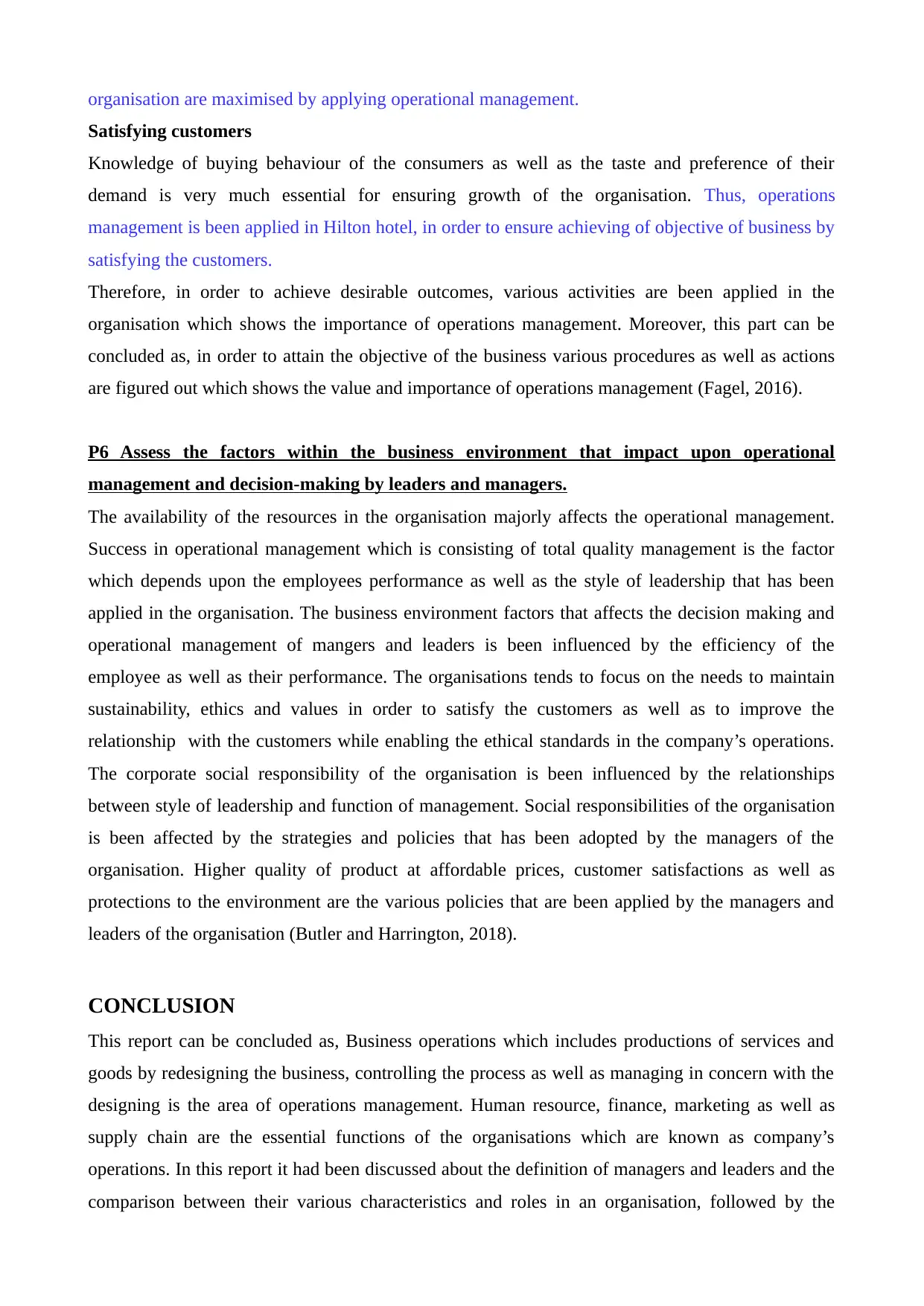
organisation are maximised by applying operational management.
Satisfying customers
Knowledge of buying behaviour of the consumers as well as the taste and preference of their
demand is very much essential for ensuring growth of the organisation. Thus, operations
management is been applied in Hilton hotel, in order to ensure achieving of objective of business by
satisfying the customers.
Therefore, in order to achieve desirable outcomes, various activities are been applied in the
organisation which shows the importance of operations management. Moreover, this part can be
concluded as, in order to attain the objective of the business various procedures as well as actions
are figured out which shows the value and importance of operations management (Fagel, 2016).
P6 Assess the factors within the business environment that impact upon operational
management and decision-making by leaders and managers.
The availability of the resources in the organisation majorly affects the operational management.
Success in operational management which is consisting of total quality management is the factor
which depends upon the employees performance as well as the style of leadership that has been
applied in the organisation. The business environment factors that affects the decision making and
operational management of mangers and leaders is been influenced by the efficiency of the
employee as well as their performance. The organisations tends to focus on the needs to maintain
sustainability, ethics and values in order to satisfy the customers as well as to improve the
relationship with the customers while enabling the ethical standards in the company’s operations.
The corporate social responsibility of the organisation is been influenced by the relationships
between style of leadership and function of management. Social responsibilities of the organisation
is been affected by the strategies and policies that has been adopted by the managers of the
organisation. Higher quality of product at affordable prices, customer satisfactions as well as
protections to the environment are the various policies that are been applied by the managers and
leaders of the organisation (Butler and Harrington, 2018).
CONCLUSION
This report can be concluded as, Business operations which includes productions of services and
goods by redesigning the business, controlling the process as well as managing in concern with the
designing is the area of operations management. Human resource, finance, marketing as well as
supply chain are the essential functions of the organisations which are known as company’s
operations. In this report it had been discussed about the definition of managers and leaders and the
comparison between their various characteristics and roles in an organisation, followed by the
Satisfying customers
Knowledge of buying behaviour of the consumers as well as the taste and preference of their
demand is very much essential for ensuring growth of the organisation. Thus, operations
management is been applied in Hilton hotel, in order to ensure achieving of objective of business by
satisfying the customers.
Therefore, in order to achieve desirable outcomes, various activities are been applied in the
organisation which shows the importance of operations management. Moreover, this part can be
concluded as, in order to attain the objective of the business various procedures as well as actions
are figured out which shows the value and importance of operations management (Fagel, 2016).
P6 Assess the factors within the business environment that impact upon operational
management and decision-making by leaders and managers.
The availability of the resources in the organisation majorly affects the operational management.
Success in operational management which is consisting of total quality management is the factor
which depends upon the employees performance as well as the style of leadership that has been
applied in the organisation. The business environment factors that affects the decision making and
operational management of mangers and leaders is been influenced by the efficiency of the
employee as well as their performance. The organisations tends to focus on the needs to maintain
sustainability, ethics and values in order to satisfy the customers as well as to improve the
relationship with the customers while enabling the ethical standards in the company’s operations.
The corporate social responsibility of the organisation is been influenced by the relationships
between style of leadership and function of management. Social responsibilities of the organisation
is been affected by the strategies and policies that has been adopted by the managers of the
organisation. Higher quality of product at affordable prices, customer satisfactions as well as
protections to the environment are the various policies that are been applied by the managers and
leaders of the organisation (Butler and Harrington, 2018).
CONCLUSION
This report can be concluded as, Business operations which includes productions of services and
goods by redesigning the business, controlling the process as well as managing in concern with the
designing is the area of operations management. Human resource, finance, marketing as well as
supply chain are the essential functions of the organisations which are known as company’s
operations. In this report it had been discussed about the definition of managers and leaders and the
comparison between their various characteristics and roles in an organisation, followed by the
⊘ This is a preview!⊘
Do you want full access?
Subscribe today to unlock all pages.

Trusted by 1+ million students worldwide
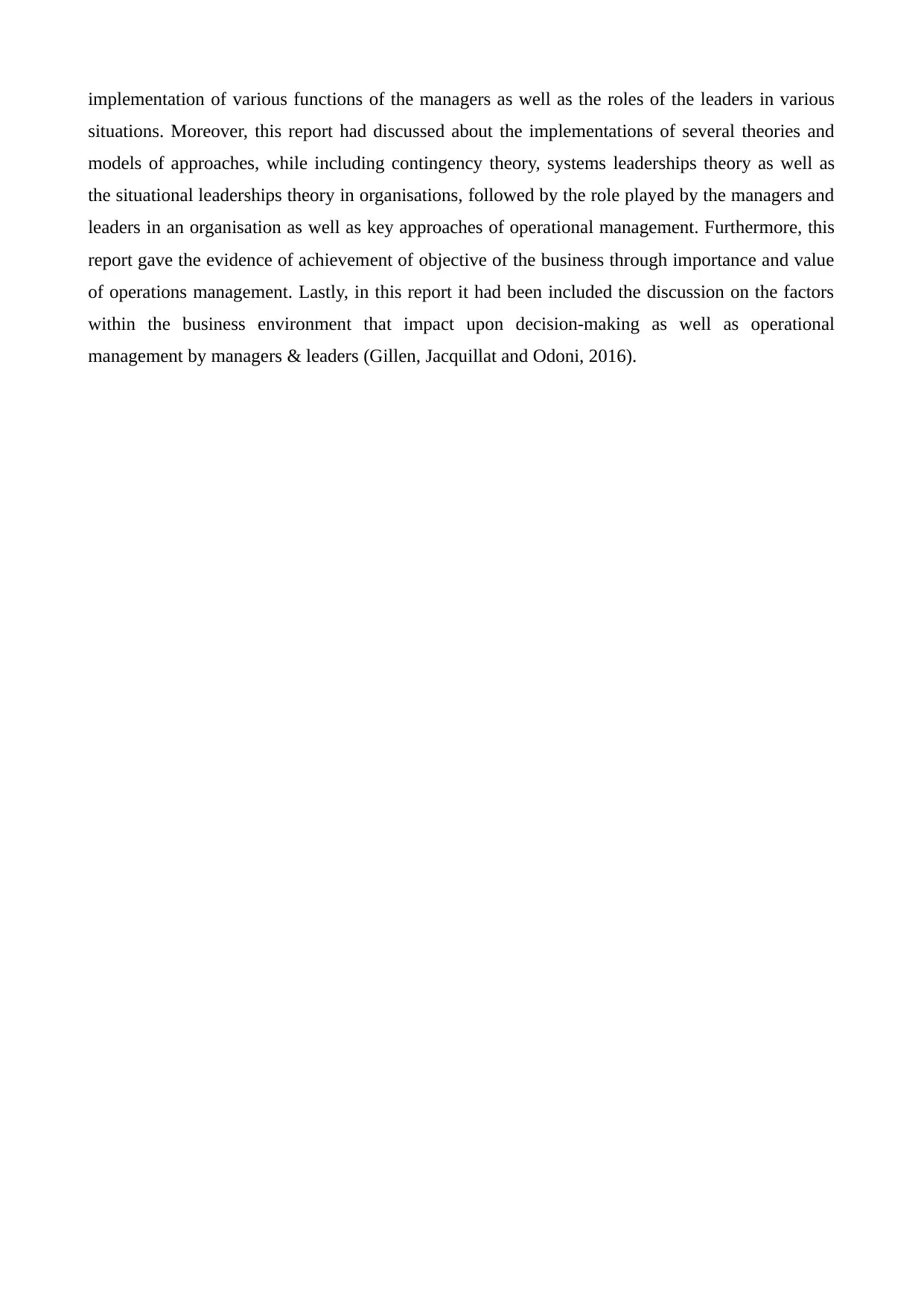
implementation of various functions of the managers as well as the roles of the leaders in various
situations. Moreover, this report had discussed about the implementations of several theories and
models of approaches, while including contingency theory, systems leaderships theory as well as
the situational leaderships theory in organisations, followed by the role played by the managers and
leaders in an organisation as well as key approaches of operational management. Furthermore, this
report gave the evidence of achievement of objective of the business through importance and value
of operations management. Lastly, in this report it had been included the discussion on the factors
within the business environment that impact upon decision-making as well as operational
management by managers & leaders (Gillen, Jacquillat and Odoni, 2016).
situations. Moreover, this report had discussed about the implementations of several theories and
models of approaches, while including contingency theory, systems leaderships theory as well as
the situational leaderships theory in organisations, followed by the role played by the managers and
leaders in an organisation as well as key approaches of operational management. Furthermore, this
report gave the evidence of achievement of objective of the business through importance and value
of operations management. Lastly, in this report it had been included the discussion on the factors
within the business environment that impact upon decision-making as well as operational
management by managers & leaders (Gillen, Jacquillat and Odoni, 2016).
Paraphrase This Document
Need a fresh take? Get an instant paraphrase of this document with our AI Paraphraser
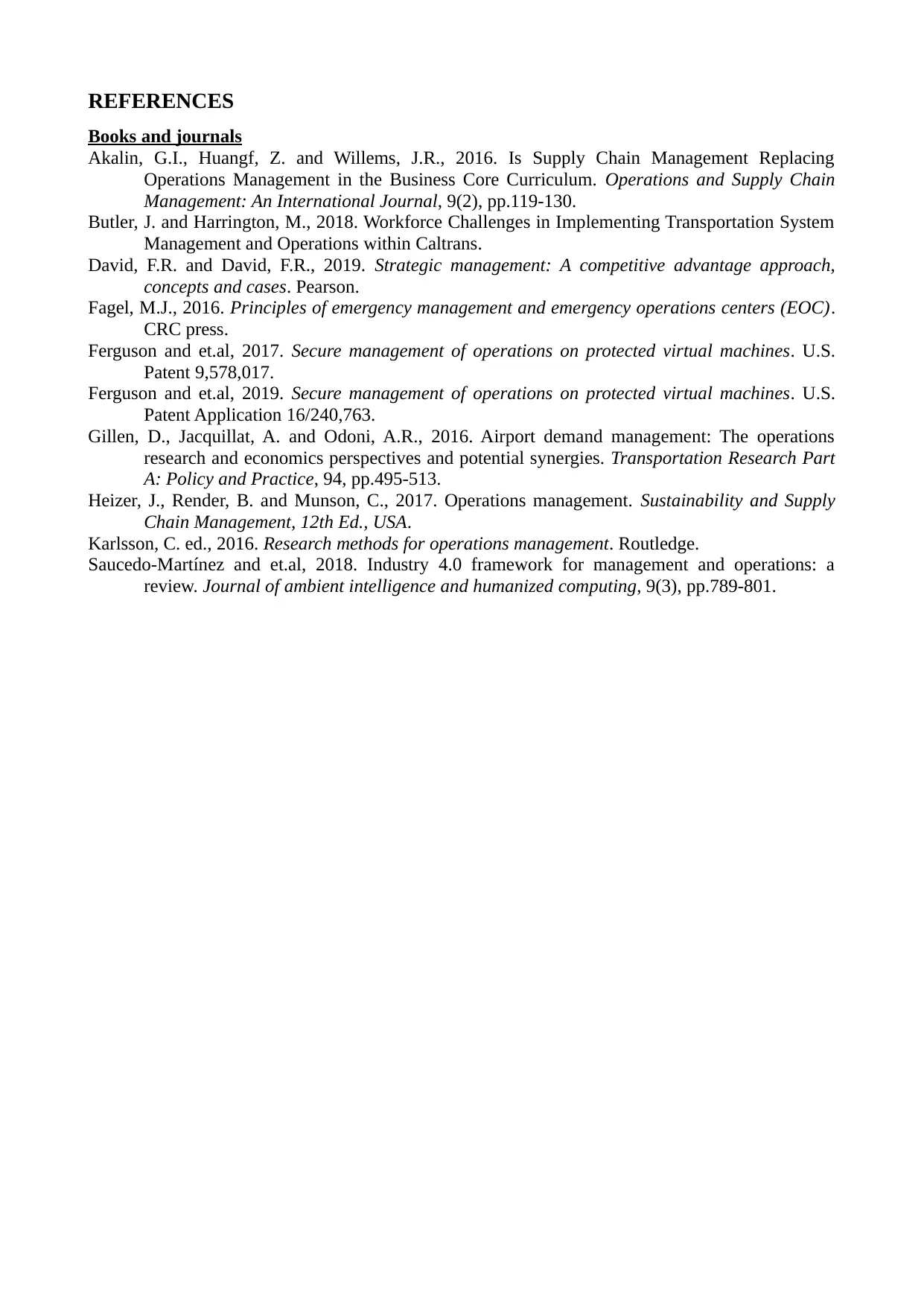
REFERENCES
Books and journals
Akalin, G.I., Huangf, Z. and Willems, J.R., 2016. Is Supply Chain Management Replacing
Operations Management in the Business Core Curriculum. Operations and Supply Chain
Management: An International Journal, 9(2), pp.119-130.
Butler, J. and Harrington, M., 2018. Workforce Challenges in Implementing Transportation System
Management and Operations within Caltrans.
David, F.R. and David, F.R., 2019. Strategic management: A competitive advantage approach,
concepts and cases. Pearson.
Fagel, M.J., 2016. Principles of emergency management and emergency operations centers (EOC).
CRC press.
Ferguson and et.al, 2017. Secure management of operations on protected virtual machines. U.S.
Patent 9,578,017.
Ferguson and et.al, 2019. Secure management of operations on protected virtual machines. U.S.
Patent Application 16/240,763.
Gillen, D., Jacquillat, A. and Odoni, A.R., 2016. Airport demand management: The operations
research and economics perspectives and potential synergies. Transportation Research Part
A: Policy and Practice, 94, pp.495-513.
Heizer, J., Render, B. and Munson, C., 2017. Operations management. Sustainability and Supply
Chain Management, 12th Ed., USA.
Karlsson, C. ed., 2016. Research methods for operations management. Routledge.
Saucedo-Martínez and et.al, 2018. Industry 4.0 framework for management and operations: a
review. Journal of ambient intelligence and humanized computing, 9(3), pp.789-801.
Books and journals
Akalin, G.I., Huangf, Z. and Willems, J.R., 2016. Is Supply Chain Management Replacing
Operations Management in the Business Core Curriculum. Operations and Supply Chain
Management: An International Journal, 9(2), pp.119-130.
Butler, J. and Harrington, M., 2018. Workforce Challenges in Implementing Transportation System
Management and Operations within Caltrans.
David, F.R. and David, F.R., 2019. Strategic management: A competitive advantage approach,
concepts and cases. Pearson.
Fagel, M.J., 2016. Principles of emergency management and emergency operations centers (EOC).
CRC press.
Ferguson and et.al, 2017. Secure management of operations on protected virtual machines. U.S.
Patent 9,578,017.
Ferguson and et.al, 2019. Secure management of operations on protected virtual machines. U.S.
Patent Application 16/240,763.
Gillen, D., Jacquillat, A. and Odoni, A.R., 2016. Airport demand management: The operations
research and economics perspectives and potential synergies. Transportation Research Part
A: Policy and Practice, 94, pp.495-513.
Heizer, J., Render, B. and Munson, C., 2017. Operations management. Sustainability and Supply
Chain Management, 12th Ed., USA.
Karlsson, C. ed., 2016. Research methods for operations management. Routledge.
Saucedo-Martínez and et.al, 2018. Industry 4.0 framework for management and operations: a
review. Journal of ambient intelligence and humanized computing, 9(3), pp.789-801.
1 out of 11
Related Documents
Your All-in-One AI-Powered Toolkit for Academic Success.
+13062052269
info@desklib.com
Available 24*7 on WhatsApp / Email
![[object Object]](/_next/static/media/star-bottom.7253800d.svg)
Unlock your academic potential
Copyright © 2020–2026 A2Z Services. All Rights Reserved. Developed and managed by ZUCOL.





